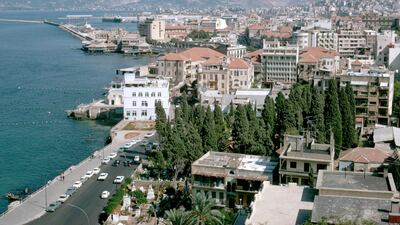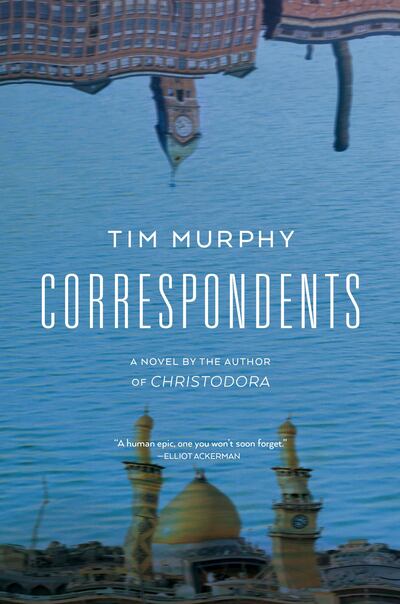After nine years away, Rita Khoury returns to Boston's North Shore to be reunited with her Irish-Lebanese family at a mahrajan (festival). She introduces her new boyfriend Jonah to "Middle Eastern exotica" and catches up with relatives such as her older sister Ally, her formidable mother Mary Jo and her war veteran cousin Bobby. But when the party is in full swing, an uninvited guest walks in with a sense of a purpose and a dark object that Rita recognises with a pang of horror.
Tim Murphy's latest novel begins ominously and with the solemn cautionary note that "everything changed that afternoon". Before finding out what changed, we need to know what happened. But having snared his readers, Murphy makes them wait several hundred pages before resuming the party and revealing the destructive agenda of its gatecrasher.
Such a strategy is not easy for the author to pull off. Fortunately, what unfolds between Murphy's provocative opener and shock denouement is deeply immersive and intensely powerful. Like his 2016 novel Christodora, which follows a motley mix of characters in New York from the 1980s to the present, Correspondents traces lives through the years.
This time Murphy's sharply realised focus is the effects of war, migration and refugeehood on people.
During her sophomore year at high school, intelligent, go-getting Rita devises a future plan for herself – she will become a Middle East expert and work as a correspondent for a major newspaper. "The language, the culture, the region – she would take them all back, make them her own."
In 2000, she achieves her goal, securing a coveted position with the American Standard in Beirut. She mingles with other foreign journalists, falls for "the world's most glamorous Palestinian refugee", and revels in her cosmopolitan surroundings.
But Rita is all too aware that a stint in a battle-scarred city is not enough. To make a name for herself in her chosen career she soon realises that she needs to serve in an active war zone, so she is sent to Iraq to report on the carnage and chaos that reigns after the US invasion. Despite the bombs, the casualties, "the nerve-strafing car rides" and "the constant ambient rat-tat-tat of Kalashnikovs", she comes to love what shedescribes as "the ugly, dusty, doomed capital".
That affection develops as she forges a closer working relationship and friendship with her loyal and talented Baghdad-born interpreter and guide, Nabil. They experience their fair share of scrapes but in time their lives become too dangerous. When she is betrayed and contemplates professional disgrace and he is blackmailed and faces death, they are forced to flee and pick up the pieces of their fractured lives in exile.
Correspondents is an expansive, multigenerational epic, rich in empathy and insight. Although largely Rita's story, the early chapters are devoted to family members who came before her. Murphy starts the story properly in 1912 with the Irish Coughlins and the Lebanese Kourys escaping poverty to make a new home for themselves in Lawton, Massachusetts.
The novel gathers momentum when Murphy fast-forwards to the 1960s and turns his focus to Mary Jo Coughlin and George Khoury. He is a young orthopaedic surgeon, while she is his former student who jumps at the chance to work alongside him as both associate and nurse. But she doesn't simply join his practice. When romance blossoms, she is drawn into "his sprawling, incestuous, bickering, tightly knit family – infinite layers of aunts, uncles and cousins, intrigues, petty rivalries and grudges that went back decades".
Order is imposed with the birth of Rita. Murphy's narrative becomes more streamlined and less episodic. The long, detailed sections that shadow Rita in Lebanon and Iraq are by far the most compelling. Rita is rendered vividly alive in those pages and her exploits and observations read like a blend of carefully controlled drama and well-crafted reportage. These sections are so captivating that Murphy's later, closing chapters in the US resemble a tacked-on coda rather than a topped-and-tailed conclusion.
But the novel is not only about Rita and her family. Murphy takes a risk by opening up a new front after a hundred pages and bringing in Nabil. It's a gamble that pays off handsomely. Nabil turns out to be a man with unresolved desires and thwarted ambitions, an outsider and an underdog. He struggles to succeed and be true to himself, and as such emerges as yet another character for us to root for.
As with many long stories, Correspondents is flabby in places. Some scenes drag on and one or two characters outstay their welcome. But for the most part, Murphy keeps everything in proportion, right down to Rita's succinct point about the Iraq war. "We made this mess. We have to clean it up."
A tale of love, war and family bonds, this is a novel with scope and heft.


